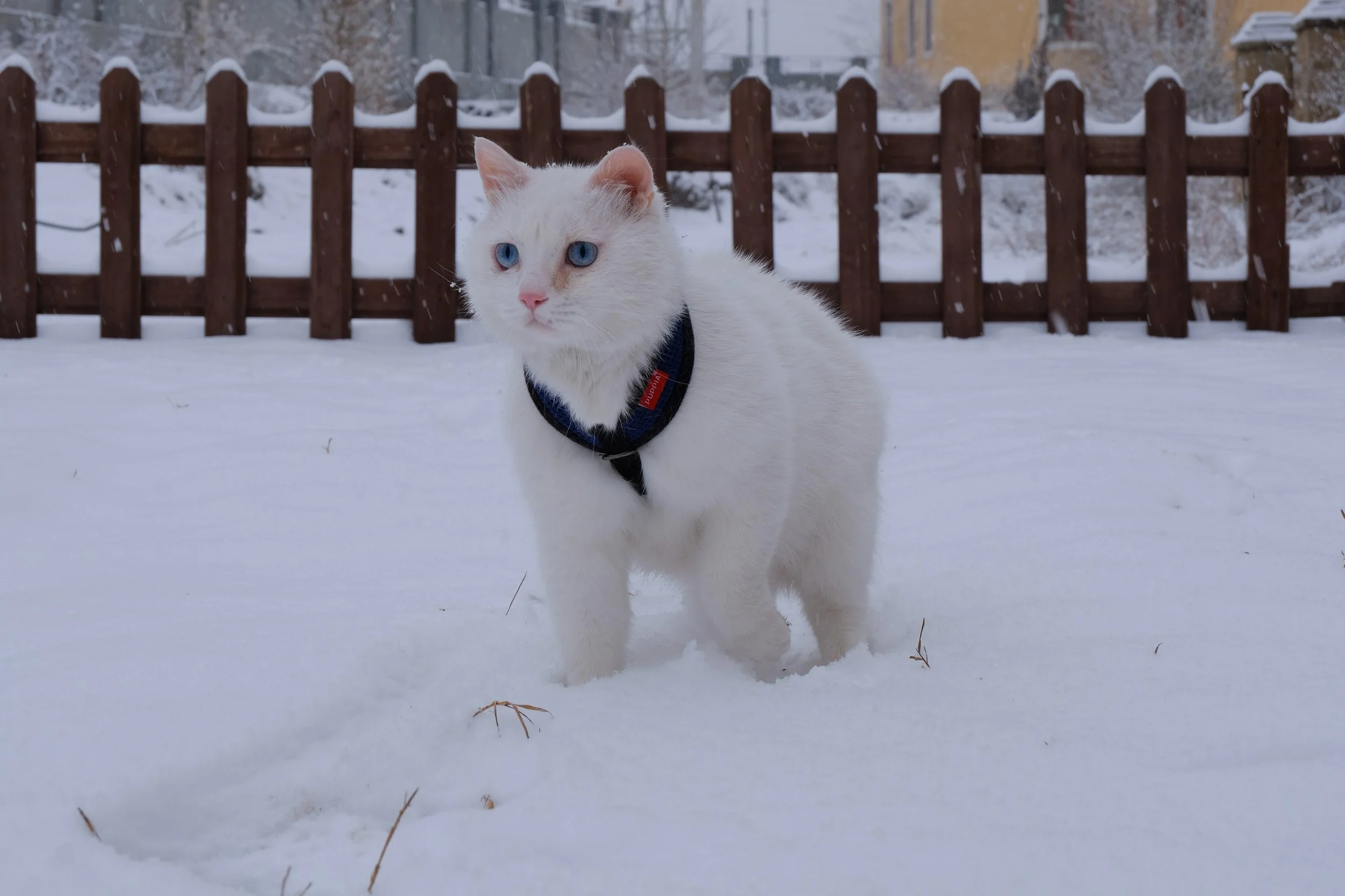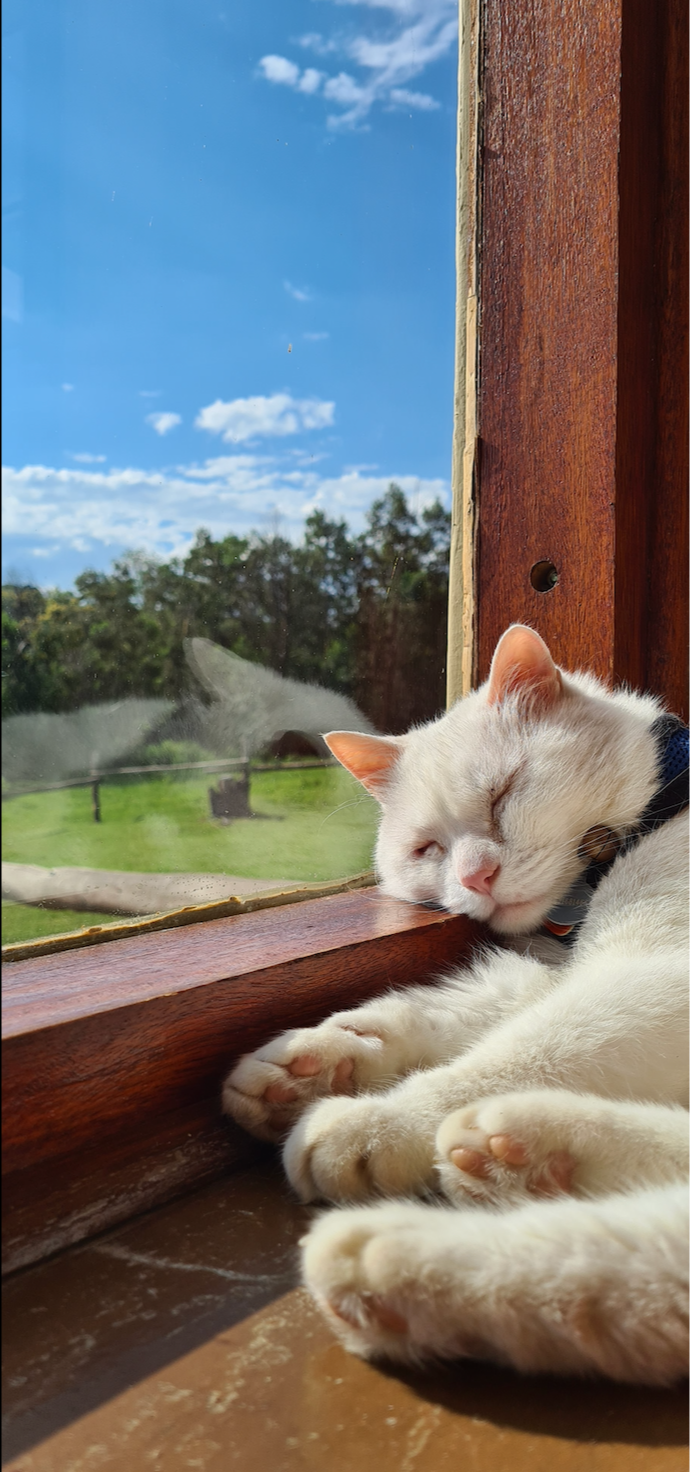Claws, Contracts, and Cuddles: Travelling the World with a Cat
By SCAS Communications Officer, Neha Arora
On International Cat Day, Neha Arora from the Society for Companion Animal Studies (SCAS) shares her personal journey of relocating internationally with her cat, Shiro. Through their story, she explores the emotional and practical challenges of finding pet-friendly accommodation across borders and highlights the urgent need for more inclusive housing policies that reflect the role of companion animals in our lives.
Shiro was found in the most unlikely of places – a dog shelter on the freezing outskirts of Ulaanbaatar, Mongolia. I used to volunteer there on weekends, walking dogs and helping out where I could. One afternoon, as the usual chorus of barking filled the kennels, I noticed something unusual: a white cat, caged in the middle tier of a wall of small enclosures, squeezed between dogs on either side.
Shiro’s in the shelter; photograph by author
Shiro had the brightest blue eyes I'd ever seen and looked almost ethereal against the chaos around him. Shelter volunteers explained that he’d been found wandering the streets alone, covered in mud, in freezing temperatures that often dipped below -30°C. No one had even realised he was white until after his first proper scrub. Without the heart to put him back out on the street, they gave him a temporary home – wedged into a space designed for someone else.
On a whim, I reached a finger through the bars to pet him. Without hesitation, he wrapped his tiny paw around it and held on. I've always considered myself a dog person – our two Indian Pariah dogs, Champ and Jebo, had joined us in Mongolia and filled our home with their usual joyful mayhem. But there was something about Shiro’s quiet gaze that melted me right away. I offered to foster him “just for a while.” You can guess how that turned out.
Bringing him home involved the usual learning curve, introducing him to our dogs, figuring out his likes and dislikes, and adjusting to life with a cat who firmly believes he owns the place. But we quickly ran into our first major hurdle: our landlord. Despite having already negotiated – with great difficulty – a rental that allowed dogs, cats were another matter entirely. “They scratch,” our landlord said flatly. “They ruin things, and future tenants might have allergies.” And so began our long, often exhausting global quest for pet-friendly rentals.
Shiro in Mongolia; photograph by author
As we moved from Mongolia to South Africa, then to Sweden, and now to the UK, each new country brought its own housing challenges. Shiro travelled continents with us, a calming constant in our ever-shifting world. But rules, regulations, and cultural attitudes around pets – especially cats – varied wildly. Sometimes we encountered blanket pet bans; other times the rules were vague, left entirely to landlord discretion. Even where pets were “technically allowed,” extra deposits or pet clauses created financial and emotional burdens.
Over time, I discovered this wasn't just our problem. Around the world, people who love their pets struggle to find stable housing. According to a 2021 Battersea Dogs and Cats Home report, in the UK, roughly 40% of rental homes don't allow dogs, and 37% exclude cats. For families like ours – with both dogs and cats – finding suitable housing becomes even trickier, shrinking an already small pool of available homes. This lack of pet-friendly housing forces people into difficult choices: their home or their companion. A publication by Mars Petcare UK and Battersea Dogs & Cats Home reports that housing issues are a top reason people give up their pets. The situation is especially challenging for lower-income households, domestic violence survivors, older adults, people experiencing homelessness, disabled people, and ethnic minority renters, who face greater discrimination when renting with pets. Recognising the urgency of this issue, several organisations have been advocating for change.
Since its founding in 1979, the Society for Companion Animal Studies (SCAS) has worked to make housing more inclusive of companion animals, recognising them as essential members of many families. SCAS’s advocacy ranges from supporting academic research and conferences to partnering with charities and advocacy groups campaigning for change. At the heart of this work is the growing body of evidence showing that pets contribute meaningfully to our emotional wellbeing, social lives, and health. Despite this, housing policies often fail to reflect these realities. That’s why SCAS supports policies that encourage landlords to consider pet requests openly and fairly – with a starting point that pets should be welcomed unless there’s a valid reason not to.
The UK’s Model Tenancy Agreement, revised in 2021, was a step in the right direction, encouraging landlords to allow pets by default and shifting the burden of justification away from renters. However, because it isn’t legally binding, uptake has been patchy, leaving many renters in competitive housing markets still compelled to hide their pets or accept precarious living situations. SCAS provides guidance on finding pet-friendly accommodation, including essential questions renters can ask housing providers and landlords to secure fairer agreements.
My own experience – with Shiro nestled in my lap as I browse rental listings, filtering again by “pet-friendly” and mentally preparing for another negotiation – feels deeply personal. Yet it’s part of a broader structural issue. Companion animals are increasingly recognised as crucial to human wellbeing. It's time housing systems reflected that reality, enabling families – of all species – to live together safely and securely.
This International Cat Day, I’ll be celebrating with Shiro – now older, a bit grumpier, and still ruling the household with quiet authority. He's lived in four countries, outlasted countless couches, and taught me more about patience, persistence, and presence than I ever expected from a creature who naps eighteen hours a day. Above all, he’s shown me home isn’t just a place; it’s a relationship-built moment by moment, paw by paw. As we reflect on the joy and comfort cats bring to our lives, let’s remember that every cat deserves a secure home, and every person deserves the chance to keep their beloved companion by their side.
Follow us on Facebook, X (@SCASuk) and BlueSky (@scas1979), and be sure to retweet posts from us and our partners on #PetsInHousing
SCAS is the UK’s leading human-companion animal bond organisation through funding research, providing education, raising awareness, encouraging best practice, and influencing the development of policies and practices that support the human-companion animal bond. For more details check out our website at www.scas.org.uk



